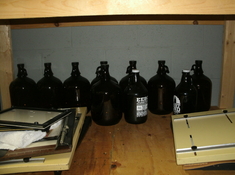Do you think this presumption is not right?
Yes, I think so.
As to the growlers: if these are the ones with the swing top and a rubber ring to create a seal between a ceramic (or plastic) plug and the bottle: my experiences with this kind of system are poor. It's not very suitable for stuff like developers as the seal isn't all that good, at least not upon reuse and the fact that some chemistry may make the rubber seal brittle or otherwise degrade it. Screw caps, on the other hand, generally work extremely well. The kind that @chuckroast mentioned, the polycone ones, sound particularly nice, but I also have good experiences with plain plastic screw-on caps.
Wine bags.
I'm trialing these, but so far, I find them inconvenient to handle. The advantage is that they are very space-efficient, but even with an outer cardboard box (which eliminates part of the space savings argument), it's just a flappy and unwieldy piece of ... stuff... to handle. It's a personal thing.




